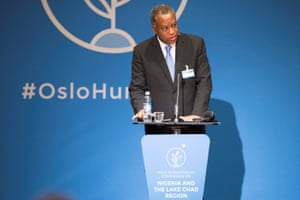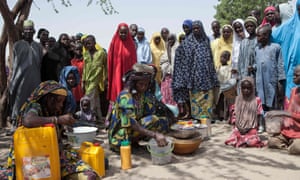Donors pledge $672m at Oslo summit to avert famine in Nigeria and Lake Chad
Norway leads funding commitments as summit raises one-third of $1.5bn needed to avert famine by reaching 3 million people within five months
A third of the $1.5bn in emergency funding sought by the UN this year to prevent a famine in Africa’s stricken Lake Chad region has been raised at a summit in Oslo.
The US has not yet made any new pledge of money.
Aid agencies must get food to almost 3 million people by July to avert a famine in the region. The conditions for a largely neglected crisis have been created by drought, chronic poverty and Islamist insurgents Boko Haram, the UN said on Friday.
More than 10 million people are in need of life-saving aid in the region, where – as in Yemen and Somalia – humanitarian agencies have warned of the looming threat of famine.
On Monday, famine was declared in parts of South Sudan.
The summit’s host country, Norway, led efforts by pledging $192m (£153m) of the $672m promised by international donors for the next three years. Further contributions are expected later this year from the UK and the US.
Despite worries among many that the arrival of Donald Trump in the White House could sound the deathknell for large-scale US support for relief efforts in Africa, the UN emergency relief coordinator, Stephen O’Brien, voiced hope that the US would continue to retain its position as the largest aid donor to the region, and principally Nigeria.
Initial examinations suggested all of the $672m pledged at the conference was new money, said O’Brien. He said two unnamed countries had indicated they would pledge substantial contributions.
“Clearly the Americans are in transition so we have to wait for that to move forward,” O’Brien said.
“It takes time for transitions to go through. Likewise for the UK, their annual budgeting cycle ends on 5 April and the new one starts on 6 April.
“This is the first out of the stalls of the big four pledging conferences that we have got lined up for the year and, in my personal view, to raise $672m of new money in a morning is spectacular, when the overall ask is $1.5bn for the calendar year.”
O’Brien added that, based on past experience of emergency response being maintained even in the face of broader policy adjustments, he was not pessimistic about the prospect of the US remaining the largest international contributor to the Lake Chad region.
His comments followed reports that the Trump administration is preparing to order sweeping funding cuts to the UN and other international organisations.
Matthew Nims, the deputy director of USAid’s office of food for peace programme, said the threat of famine in Nigeria was greater than ever. “A lot of us in this business knew this was coming,” said Nims. “We could see this and I think we – the governments in the region, those around the table here – need to accept that there was a failure on all our parts to see where we have come to.
“All of us know that it’s also not the only country. If you look at 2017 it may be the great year of transition on many levels, but we don’t want it to be the year when famine becomes a more commonplace word. We are in unprecedented times of food insecurity.”
Jamie Drummond, co-founder of the advocacy organisation One, welcomed the new funding pledges. “History of sorts has been made today in Oslo and the good news is that key countries and partners assembled, admitted the challenge and put meaningful funds on the table.
“However, the devil lies in the details and the angels of accountability need a bit more help than we’ve heard so far. Local citizens’ groups on the ground, backed by anti-corruption partners globally, need to be able to look more closely at what is new, what is not, and any discrepancy between what is pledged in Norway, and what is actually spent on lifesaving services delivered for citizens in each clinic and classroom across the region.”
One is putting in place a resource tracker to allow pledges to be tracked.
The Oslo summit, taking place after UN agencies warned the crisis was “drastically deteriorating” in parts of northern Nigeria and neighbouring areas of the Lake Chad region, also brought what many regarded as a shift in the attitude of the Nigerian government.
For the first time, the government produced a figure – $1bn – that it was planning to direct to the country’s stricken north. Nigeria’s foreign minister, Geoffrey Onyeama, said the crisis could not have come at a worse time, with the country suffering from severe financial constraints caused by the falling price of crude oil and the need to continue funding its military operation against Boko Haram.
With the focus primarily on monetary pledges, much less was said about sensitive issues such as how to rehabilitate former Boko Haram fighters, the fate of thousands of young men who are believed to be in the custody of the Nigerian military, and the threat posed by endemic corruption to aid spending and rebuilding efforts.
On Thursday, a separate conference of NGOs heard a call from Ilaria Allegrozzi, Amnesty International’s Lake Chad researcher, for the wider recovery effort to have a greater dimension focused on the rehabilitation of Boko Haram fighters who, she added, had been “portrayed as devils, people beyond any repair or help”.
The outspoken governor of Nigeria’s north-eastern Borno state, Kashim Shettima, said some rehabilitation of former fighters had taken place but insisted the group’s make-up had to be seen as a “triangle”.
“At one end there are the ideologically driven Boko Haram, who will resist any reintegration. Then you have the forcefully conscripted Boko Haram. Then there are the fortune seekers who join for economic reasons,” he said.
Boko Haram militants have killed about 15,000 people and forced more than 2 million from their homes during a seven-year insurgency.
Efforts to provide assistance to northern Nigeria have assumed an added urgency ahead of the next planting season in the region, which is due to start in May, with farming communities needing seeds, tools and help to replace destroyed resources.
“In the worst-affected areas, famine continues to loom – and millions will remain trapped in cycles of severe hunger if we don’t enable farmers to start cropping now,” said Dominique Burgeon, director of the Food and Agriculture Organisation’s emergency and rehabilitation division.



Comments
Post a Comment